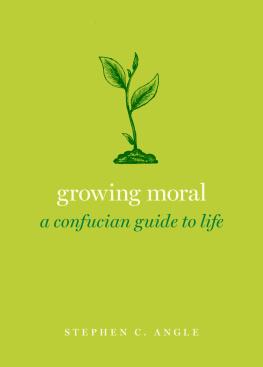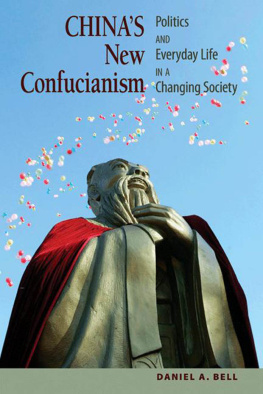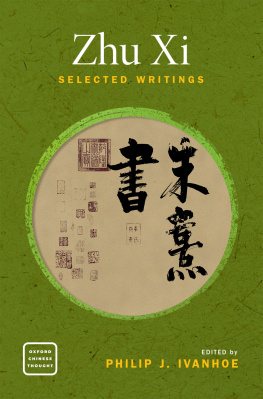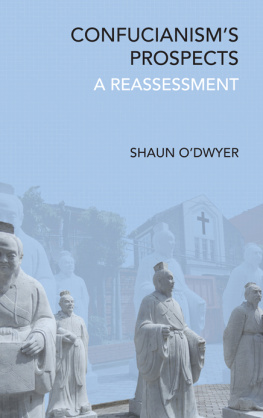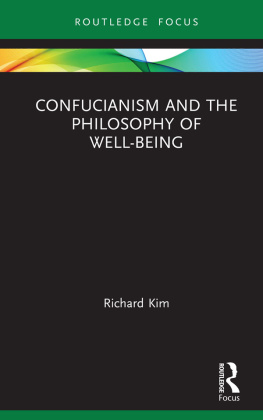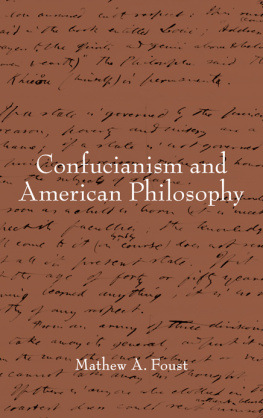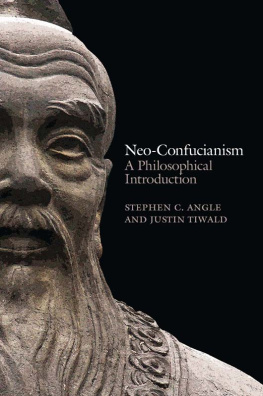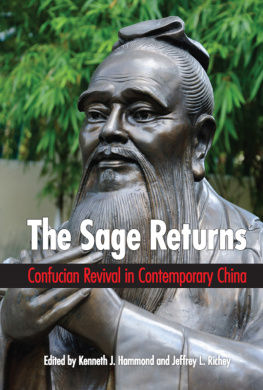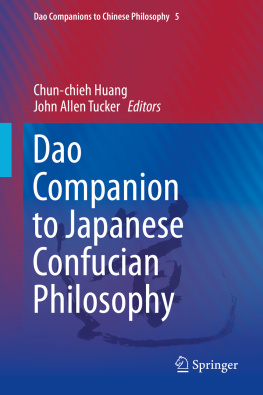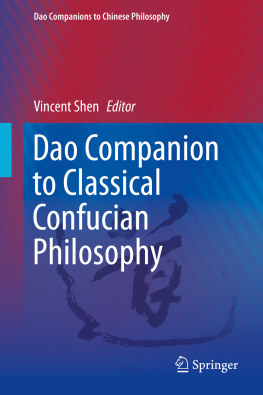Life Confucianism as a New Philosophy:Love and Thought
by HUANG Yushun
Copyright 2020 HUANG Yushun
Published by Bridge21 Publications, LLC www.bridge21.us
Distributed by Casemate Group https://www.casemategroup.com
Casemate Academic: USA and North America www.casemateacademic.com
Oxbow Books: UK, Europe and the Rest of the World www.oxbowbooks.com
All rights reserved. English language rights are licensed to Bridge21 Publications, LLC. No part of this book may be used or reproduced in any manner whatsoever without written permission from the publisher except in the case of brief quotations embodied in critical articles and reviews.
Translation Supported by the Chinese Fund for the Humanities and Social Sciences (Grant No. 13WZX008)
Translated by Li Xuening and Yan Meirong
Revised by Ben Abbey
Cover Design: Tanya van Ness
Interior Design: Linda Ronan
Published in the United States of America
ISBN 978-1-62643-006-8 Hardcover
ISBN 978-1-62643-007-5 ePub | ebook pdf | Kindle
PREFACE TO THE ENGLISH EDITION
As a contemporary theoretical form of Confucianism, Life Confucianism has been widely recognized in the fields of Confucianism and Philosophy in China. A number of famous scholars have made comments regarding Life Confucianism in academic journals.
Moreover, Life Confucianism has established an international influence. I personally authored an article introducing Life Confucianism published in Dao: A Journal of Comparative Philosophy . The philosopher Stephen Angle made a comment on Life Confucianism in his monograph, Contemporary Confucian Political Philosophy Toward Progressive Confucianism , and I was classified as one of the Synthetic Confucians, together with many other philosophers such as Roger Ames, Robert Neville, Thomas Metzger, and so on.
However, the essential aspects of Life Confucianism have not fully come across in some English-speaking countries. For example, Stephen Angle misunderstood the assumption that these individuals, i.e., Confucian researchers, may identify with multiple traditions and draw centrally It seems to me that the remark overlooks my criticisms of Heideggers phenomenology. What is more, there are some limitations in the interpretation of Life Confucianism merely from the perspective of political philosophy.
Having written five books on Life Confucianism, I selected Love and Thought: Life Confucianism as a New Philosophy to be the most representative work. So, I trusted Professor Li Xuening and his team with its translation. After the completion of the first draft of the translation, I was engaged in its revision.
The process of revising the English version gave me a chance to reflect on Life Confucianism in the context of trans-cultural communication. My reflection was mainly related to the linguistic and ideological problems of communication between China and the West, which are inevitably exposed in a Chinese-English translation. Here, I would like to take this opportunity to offer a brief explanation.
As for the translation, I will discuss this issue in Section 1.1, Lecture I of this bookEquality and Equivalency: Proper Name and Functional Position. The main idea is that there are both equivalencies and incompatibilities between different languages. There is certainly an equivalency between two languages; otherwise, it would be impossible for people to translate and understand each other. However, the equivalency is not a precise one-to-one corresponding relationship. That is to say, it is not based on the strict semantic equivalence of two words in different languages. In fact, there are often few one-to-one correspondences between words of two languages in terms of meaning. Here and there, such inequality is so serious that a word cannot be translated directly at all. It reminds me of ( dao ), a key word in Chinese philosophy. There were many different free translations, such as Way, Infinity, Logic and so on. However, its transliteration, i.e., Tao is more popular.
To take another example, the Chinese word ( qing ) is arguably one of the key words involved in Life Confucianism (cf. Section 2.2, Lecture II of this book). It cannot be translated directly into English. The reason is that ( qing ) is a polysemous word containing two meanings: emotion ( ganqing ) and action ( shiqing ). I found it very Chuang Tzu used the same word ( qing ) either in negating ( ren zhi qing ) as a subjectivity or affirming ( shi zhi qing ) as the Source, so I really didnt know how to deal with the translation at first. After much thought, I chose to translate ( qing ) as Qing or qing, which is analogous to the translation of ( dao ) into Tao or tao. I hope for Qing or qing to be listed as an entry in English dictionaries in the future, just as Tao or tao has been.
I noted just now that ( qing ) is one of the most important key words in Life Confucianism. As a matter of fact, this statement applies not only to Life Confucianism, but also to Confucianism or even to Chinese culture as a whole. My statement is based on an interesting discovery; orthographically, the radical on one side of the Chinese character ( qing ) is ( xin ), the literal meaning of which is emotion. The Ancient Chinese catalogued four emotionspleasure, anger, sorrow and joy Superficially, there seems to be no relation between these emotions and actions. However, the Ancient Chinese sometimes used the word ( qing ) to refer to ( shi ), so we have a word ( shiqing ) (action) and a group of interrelated words such as ( shiqing ) (fact), ( qingkuang ) (condition), ( qingjing ) (scene), ( qingjing ) (situation) and so on. That is to say, both emotions and actions are realizations of Qing.
I once mentioned that the underlying foundation of Western philosophy is the unity of being, thought and language. It is a pity that this viewpoint has not been fully perceived. Therefore, it is necessary to illustrate this viewpoint so as to help readers have a better understanding of Life Confucianism.
Of course, the most important key word in Life Confucianism is life ( shenghuo ). So, what is the relation among life, emotion, action, and human beings? When it comes to ( qingjing ) (scene) and ( qingjing ) (situation), I cannot help but think of the thought in Wang Guoweis Earthly Comment on Poetry , which discusses the issue of ( jingjie ) (dimensions). Although ( jingjie ) and ( qingjing ) share a same character ( jing ), ( qingjing ) is a compounding of ( qing ) and ( jing ). So, what is the relation between ( qing ) and ( jing )? Wang continued: All the verses of a scene are the verses of emotion. So, what is the relation between ( qing ) and ( jing )? Consequently, what is the relation of ( jing ) and ( jing )? When ( qing ) refers to emotion in particular, ancient people often talked about the relation of ( qing ) (emotion) and ( xing ) (nature), such as ( qingxing ) (emotion-nature) and ( xingqing ) (nature-emotion). Additionally, a semantic component of the Chinese character ( xing ) (nature) is ( sheng ) (life). Then, what is the relation between ( xing ) (nature) and ( sheng ) (life)? These intricate relations cause problems for translation, as well as a puzzle even for Chinese speakers. If these problems were solved, a great mystery of Chinese culture would be uncovered.
Now, let me try to clarify these relations and explain how these words should be translated into English. The reason why people were unable to clearly understand the above relations might be for the lack of some thought horizon. The thought horizon is an idea that is roughly the same in Life Confucianism and Heideggers phenomenology. However, the idea went unnoticed by Confucius, Mencius, Lao Tzu and Chuang Tzu. To put it simply, we should pull apart Being and the metaphysics of Being in order to reveal post-metaphysical being and beings. We should make it clear that what brings forth all the beings is Being, but not vice versa. All the wordsincluding life, action and emotion (or qing)are related to the distinction of what I call the gradations of ideas.


